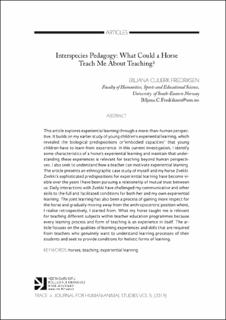| dc.contributor.author | Fredriksen, Biljana Culibrk | |
| dc.date.accessioned | 2020-04-22T10:35:25Z | |
| dc.date.available | 2020-04-22T10:35:25Z | |
| dc.date.created | 2019-09-24T11:14:35Z | |
| dc.date.issued | 2019 | |
| dc.identifier.citation | Trace — Finnish Journal for Human-Animal Studies. 2019, 5 4-30. | en_US |
| dc.identifier.issn | 2343-0591 | |
| dc.identifier.uri | https://hdl.handle.net/11250/2652057 | |
| dc.description | Trace — Journal for Human-Animal Studies is a peer-reviewed, fully open access online journal that provides a forum for research and discussion of human-animal relations from social and cultural perspectives. | en_US |
| dc.description.abstract | This article explores experiential learning through a more-than-human perspective. It builds on my earlier study of young children’s experiential learning, which revealed the biological predispositions or”embodied capacities” that young children have to learn from experience. In this current investigation, I identify some characteristics of a horse’s experiential learning and maintain that understanding these experiences is relevant for teaching beyond human perspectives. I also seek to understand how a teacher can motivate experiential learning. The article presents an ethnographic case study of myself and my horse Zvekki. Zvekki’s sophisticated predispositions for experiential learning have become visible over the years I have been pursuing a relationship of mutual trust between us. Daily interactions with Zvekki have challenged my communicative and other skills to the full and facilitated conditions for both her and my own experiential learning. The joint learning has also been a process of gaining more respect for the horse and gradually moving away from the anthropocentric position where, I realise retrospectively, I started from. What my horse taught me is relevant for teaching different subjects within teacher education programmes because every learning process and form of teaching is an experience in itself. The article focuses on the qualities of learning experiences and skills that are required from teachers who genuinely want to understand learning processes of their students and seek to provide conditions for holistic forms of learning. | en_US |
| dc.language.iso | eng | en_US |
| dc.title | Interspecies pedagogy: What could a horse teach me about teaching | en_US |
| dc.type | Peer reviewed | en_US |
| dc.type | Journal article | en_US |
| dc.description.version | publishedVersion | en_US |
| dc.source.pagenumber | 4-30 | en_US |
| dc.source.volume | 5 | en_US |
| dc.source.journal | Trace — Finnish Journal for Human-Animal Studies | en_US |
| dc.identifier.doi | 10.23984/fjhas.78122 | |
| dc.identifier.cristin | 1728215 | |
| cristin.ispublished | true | |
| cristin.fulltext | original | |
| cristin.qualitycode | 1 | |
